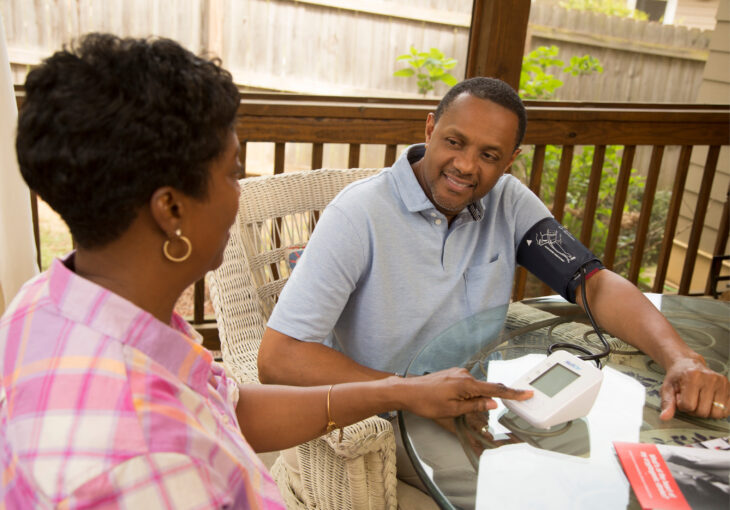High blood pressure, or hypertension, is often referred to as the “silent killer” because it can have no symptoms but still lead to severe health issues. According to the American Heart Association (Association), the world’s leading nonprofit organization focused on heart and brain health for all, nearly half of all adults in the United States have high blood pressure. Of the six largest cities in the U.S., Philadelphia has the highest prevalence of hypertension (34%). This alarming statistic underscores the importance of regularly monitoring your blood pressure to protect your heart health.
Sponsored by Main Line Health, this blog explores the significance of managing your blood pressure and highlights the critical role the Association plays in raising awareness about this health concern.
Gwyneth McNeill, DO, a cardiologist at Lankenau Heart Institute, part of Main Line Health, emphasizes that maintaining optimal blood pressure is a cornerstone of heart health, and it plays a pivotal role in overall well-being. “It’s like a roadmap to understanding the condition of your cardiovascular system. Regular check-ups are essential, as they allow us to detect and manage hypertension before it leads to more severe complications. According to the American Heart Association, high blood pressure, or hypertension, is a leading risk factor for heart disease and stroke.”
The American Heart Association has been at the forefront of blood pressure awareness and education, creating guidelines to help individuals understand what constitutes healthy blood pressure and how lifestyle changes and medications can help maintain it. In July 2022 the Association released the Essential 8 guidelines, which focuses on the eight steps to maintaining heart health. Here are some effective lifestyle modifications to help you achieve better blood pressure:
Understanding Blood Pressure:
Blood pressure is a measurement of the force of blood against the walls of your arteries. It’s expressed in two numbers – systolic pressure (the force when the heart beats) and diastolic pressure (the force when the heart rests between beats). The American Heart Association recommends maintaining a blood pressure reading of 120/80 mm Hg or lower. Elevated readings warrant attention, as they can lead to long-term health issues.
Lifestyle Modifications:
Adopting heart-healthy habits can have a profound impact on blood pressure. Create a diet that emphasizes fruits, vegetables, whole grains, lean proteins, and low-fat dairy products. Limit your daily sodium (salt) intake to less than 2,000 mg or less, as excessive salt can raise blood pressure. Processed foods are notorious for high sodium levels.
Regular exercise, as well as managing stress through techniques like meditation and yoga, can all contribute to maintaining optimal blood pressure levels. Aim for at least 150 minutes of moderate-intensity aerobic exercise or 75 minutes of vigorous-intensity exercise per week. Activities like brisk walking, swimming, and cycling can help lower blood pressure. Chronic stress can contribute to high blood pressure, so finding healthy ways to manage stress, such as through meditation, deep breathing exercises, yoga, or engaging in hobbies you enjoy can help lower your blood pressure.
Maintaining a healthy weight can have a significant impact on blood pressure reduction. Excess body weight can put extra strain on your heart and increase blood pressure.
Excessive alcohol consumption is also a culprit to rising blood pressure. Limit your alcohol intake, ideally one drink per day for women and up to two drinks per day for men.
Avoiding tobacco and vaping is one of the most preventable measures you can do to avoid heart disease or stroke. Smoking can damage blood vessels and raise blood pressure so by quitting smoking, it would be one of the best things you can do for your cardiovascular health.
Adequate sleep and maintaining a work-life balance are also essential for stress management. In July 2022 the American Heart Association added sleep as a health component to heart health, thus creating Life’s Essential 8 for healthy living.
In conclusion, taking control of your blood pressure is a crucial step in safeguarding your heart health. With the guidance of organizations like the American Heart Association and the support of healthcare providers like Main Line Health, you can learn the facts about high blood pressure, proactively manage your blood pressure and recognize the risk factors of high blood pressure to reduce your risk of heart-related complications. Remember, as Dr. McNeill advises, “Regular check-ups and a commitment to a heart-healthy lifestyle are your best allies in the fight against high blood pressure. Your heart is your most vital organ; it deserves your attention and care.”
